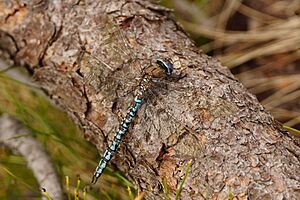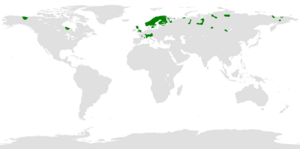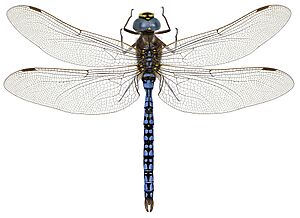Azure hawker facts for kids
Quick facts for kids Azure hawker |
|
|---|---|
 |
|
| Conservation status | |
| Scientific classification |
|
| Kingdom: | Animalia |
| Phylum: | Arthropoda |
| Class: | Insecta |
| Order: | Odonata |
| Infraorder: | Anisoptera |
| Family: | Aeshnidae |
| Genus: | Aeshna |
| Species: |
A. caerulea
|
| Binomial name | |
| Aeshna caerulea (Strøm, 1783)
|
|
 |
|
| Range of Aeshna caerulea | |
| Script error: The function "autoWithCaption" does not exist. | |
Script error: No such module "Check for conflicting parameters".
The azure hawker (Aeshna caerulea) is a type of dragonfly known for its beautiful blue markings. It's one of the smaller hawker dragonflies, a group of large, fast-flying insects. You can usually see them flying from late May to August.
Contents
About the Azure Hawker
This dragonfly is about 62 millimeters long. Both male and female azure hawkers have bright blue spots on their bodies. These spots appear on their abdomen (the long tail part) and their thorax (the middle part where wings attach).
What Does It Look Like?
The blue spots on male azure hawkers are much brighter and easier to see. Female azure hawkers have less bright blue spots. Some females can even have a brown body color instead of blue.
Color Changing Spots
Interestingly, the blue spots on males can change color! When it's cold, their spots might look more purple-gray. But as they warm up, the spots become a brighter blue. This helps them control their body temperature.
Its Daily Life
Azure hawkers love to fly in the sunshine. They often stop to rest on warm stones or tree trunks. When they bask in the sun, they lower their wings. This helps them warm up their bodies by as much as 7 degrees Celsius compared to the air temperature. Getting warmer helps them keep looking for mates. If the weather is cloudy or dull, they will often hide in plants like heather.
Where Does It Live?
This dragonfly is found in many places across Eurasia's colder, northern regions. It also lives in the Alps mountains in Central Europe. Scientists believe it's a "glacial relict." This means it's a species that survived from a much colder time, like the Ice Age.
Special Homes
Even though they live in cold areas, their young (larvae) need very specific homes. They live in small areas with warm, steady water and peaty (mossy) bottoms.
What Does It Eat?
Adult azure hawkers often eat other insects. They especially like to catch butterflies and moths that are common in boggy areas, like those found in the Alps.



